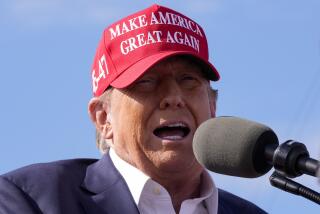Campaign Finance Law Is Explored
- Share via
WASHINGTON — Election regulators preparing to implement the nation’s new campaign finance law are stepping into one of its thorniest issues: to what extent political parties, interest groups and candidates can legally coordinate their spending.
Many of the key players, including the Democratic and Republican national committees, business lobbies and campaign watchdog groups, are offering their views at a two-day Federal Election Commission hearing that started Wednesday. The commissioners weighed in too.
“Our responsibility is to try and make sense out of what the Congress did. They rejected what we had done in this area and then turned around and gave us no particular guidance, which was not very helpful,” Commissioner Danny McDonald said.
“Our problem gets to be, I think from a very practical standpoint, what do people know, and what is their relationship with others?”
The new law, due to take effect Nov. 6, the day after the elections, will bar the national party committees from raising unlimited donations from businesses, unions and others.
The parties can currently spend such contributions, known as soft money, on general party activities such as get-out-the-vote drives and ads on party issues.
The law also directs the FEC to write new rules on the degree to which interest groups, party committees and candidates can share information and strategize with each other about election activities without it counting against federal spending limits.
Also at issue is the level at which interest groups and parties may spend on behalf of presidential and congressional candidates.
More to Read
Get the L.A. Times Politics newsletter
Deeply reported insights into legislation, politics and policy from Sacramento, Washington and beyond. In your inbox twice per week.
You may occasionally receive promotional content from the Los Angeles Times.










